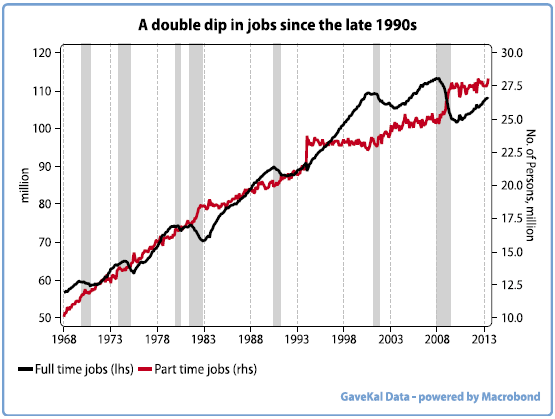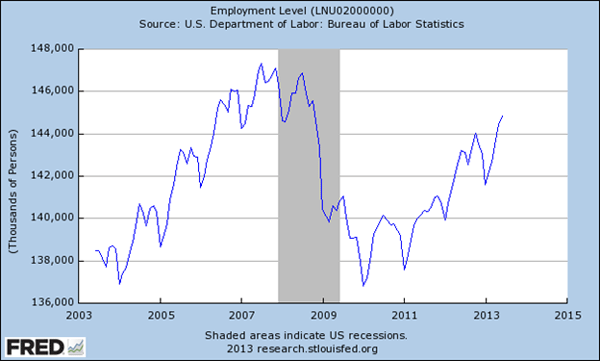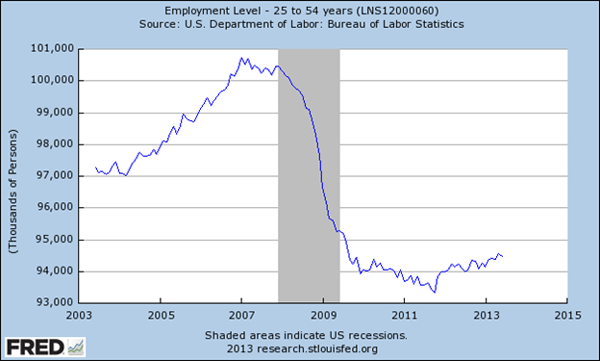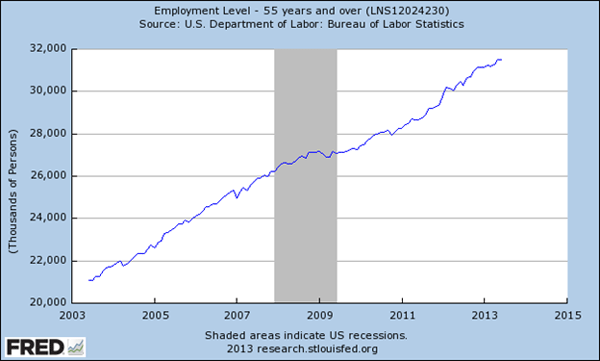
Thoughts from the Frontline: A Lost Generation
- Patrick Cox
- |
- July 29, 2013
- |
- Comments
It is pretty well established that a tax increase, especially an income tax increase, will have an immediate negative effect on the economy, with a multiplier of between 1 and 3 depending upon whose research you accept. As far as I am aware, no peer-reviewed study exists that concludes there will be no negative effects. The US economy is soft; employment growth is weak – and yet we are about to see a significant middle-class tax increase, albeit a stealth one, passed by the current administration. I will acknowledge that dealing a blow to the economy was not the actual plan, but that is what is happening in the real world where you and I live. This week we will briefly look at why weak consumer spending is going to become an even greater problem in the coming years, and we will continue to look at some disturbing trends in employment.
Last week, I noted at the beginning of the letter that an unintended consequence of Obamacare is a rather dramatic rise in the number of temporary versus full-time jobs. This trend results from employers having to pay for the health insurance of employees who work more than 29 hours a week.
I quoted Mort Zuckerman, who wrote in the Wall Street Journal:
The jobless nature of the recovery is particularly unsettling. In June, the government's Household Survey reported that since the start of the year, the number of people with jobs increased by 753,000 – but there are jobs and then there are "jobs." No fewer than 557,000 of these positions were only part-time. The June survey reported that in June full-time jobs declined by 240,000, while part-time jobs soared 360,000 and have now reached an all-time high of 28,059,000 – three million more part-time positions than when the recession began at the end of 2007.
That's just for starters. The survey includes part-time workers who want full-time work but can't get it, as well as those who want to work but have stopped looking. That puts the real unemployment rate for June at 14.3%, up from 13.8% in May.
As it turns out, the unintended consequences of Obamacare are not the only problem. Charles Gave wrote a withering indictment of quantitative easing this week (which we will look at in a few pages) and included the following chart, which caught my eye. Note that the relative increase in part-time jobs began prior to Obama's even assuming office. The redefinition of part-time as less than 29 hours a week and the new costs associated with full-time employment due to Obamacare simply accelerated a trend already set into motion.
An Ugly Secular Trend in Part-Time Work
Look closely at this graph. It turns out the trend toward part-time employment started in the recession of the early 2000s, paused only briefly, and then really took off in the recent Great Recession. This is clearly a secular trend that was in place well before 2008.

This development is very troubling, especially because it primarily affects young people and those with fewer skills. As I documented in letters last year, workers 55 and older are actually taking "market share" from younger workers. I went back tonight to see if that trend is still in place. The first graph below (the next few graphs are from the St. Louis Fed's FRED database) is one we are familiar with: the actual employment level over the last ten years. We are still two million jobs down since the onset of the last recession, some six years later. The only reason the unemployment rate has fallen at all is that several million people have simply left the labor force for one reason or another.

The next graph is the number of employed 25-54-year-olds. What you will notice is that the above graph shows about 7 million new jobs since the very bottom of the employment cycle, yet employment in the 25-54 age cohort has barely risen. Who got all the jobs?

That mystery is solved courtesy of the next chart, which shows the number of employed in the 55+ age group. Even acknowledging that there is a growing Boomer population does not account for the rather spectacular increase in employment in the 55+ age group. Can you find the recession in this chart? If the St. Louis Fed hadn't shaded the recession in gray, you certainly couldn't find it in the data. Not only did Boomers see a rise in employment, they took jobs from younger groups. If you dig down deeper, you find that the younger you are, the higher the unemployment level of your age-mates. I will spare you that exercise, as this is already depressing enough, unless you are 55+.

Note that I am not arguing that those of us over 55 should be put out to pasture. Many can't afford to quit working (especially when their kids are living with them!). I am just reporting on the facts. The only way to solve this is to grow our way out of it, yet whatever we are doing is not working.
To continue reading this article from Thoughts from the Frontline – a free weekly publication by John Mauldin, renowned financial expert, best-selling author, and Chairman of Mauldin Economics – please click here.
© 2013 Mauldin Economics. All Rights Reserved.
Thoughts from the Frontline is a free weekly economic e-letter by best-selling author and renowned financial expert, John Mauldin. You can learn more and get your free subscription by visiting www.MauldinEconomics.com.
Please write to subscribers@mauldineconomics.com to inform us of any reproductions, including when and where copy will be reproduced. You must keep the letter intact, from introduction to disclaimers. If you would like to quote brief portions only, please reference www.MauldinEconomics.com.
To subscribe to John Mauldin's e-letter, please click here: http://www.mauldineconomics.com/subscribe
To change your email address, please click here: http://www.mauldineconomics.com/change-address
Thoughts From the Frontline and MauldinEconomics.com is not an offering for any investment. It represents only the opinions of John Mauldin and those that he interviews. Any views expressed are provided for information purposes only and should not be construed in any way as an offer, an endorsement, or inducement to invest and is not in any way a testimony of, or associated with, Mauldin's other firms. John Mauldin is the Chairman of Mauldin Economics, LLC. He also is the President and registered representative of Millennium Wave Advisors, LLC (MWA) which is an investment advisory firm registered with multiple states, President and registered representative of Millennium Wave Securities, LLC, (MWS) member FINRA and SIPC, through which securities may be offered. MWS is also a Commodity Pool Operator (CPO) and a Commodity Trading Advisor (CTA) registered with the CFTC, as well as an Introducing Broker (IB) and NFA Member. Millennium Wave Investments is a dba of MWA LLC and MWS LLC. This message may contain information that is confidential or privileged and is intended only for the individual or entity named above and does not constitute an offer for or advice about any alternative investment product. Such advice can only be made when accompanied by a prospectus or similar offering document. Past performance is not indicative of future performance. Please make sure to review important disclosures at the end of each article. Mauldin companies may have a marketing relationship with products and services mentioned in this letter for a fee.
Note: Joining The Mauldin Circle is not an offering for any investment. It represents only the opinions of John Mauldin and Millennium Wave Investments. It is intended solely for investors who have registered with Millennium Wave Investments and its partners at www.MauldinCircle.com (formerly AccreditedInvestor.ws) or directly related websites. The Mauldin Circle may send out material that is provided on a confidential basis, and subscribers to the Mauldin Circle are not to send this letter to anyone other than their professional investment counselors. Investors should discuss any investment with their personal investment counsel. John Mauldin is the President of Millennium Wave Advisors, LLC (MWA), which is an investment advisory firm registered with multiple states. John Mauldin is a registered representative of Millennium Wave Securities, LLC, (MWS), an FINRA registered broker-dealer. MWS is also a Commodity Pool Operator (CPO) and a Commodity Trading Advisor (CTA) registered with the CFTC, as well as an Introducing Broker (IB). Millennium Wave Investments is a dba of MWA LLC and MWS LLC. Millennium Wave Investments cooperates in the consulting on and marketing of private and non-private investment offerings with other independent firms such as Altegris Investments; Capital Management Group; Absolute Return Partners, LLP; Fynn Capital; Nicola Wealth Management; and Plexus Asset Management. Investment offerings recommended by Mauldin may pay a portion of their fees to these independent firms, who will share 1/3 of those fees with MWS and thus with Mauldin. Any views expressed herein are provided for information purposes only and should not be construed in any way as an offer, an endorsement, or inducement to invest with any CTA, fund, or program mentioned here or elsewhere. Before seeking any advisor's services or making an investment in a fund, investors must read and examine thoroughly the respective disclosure document or offering memorandum. Since these firms and Mauldin receive fees from the funds they recommend/market, they only recommend/market products with which they have been able to negotiate fee arrangements.
PAST RESULTS ARE NOT INDICATIVE OF FUTURE RESULTS. THERE IS RISK OF LOSS AS WELL AS THE OPPORTUNITY FOR GAIN WHEN INVESTING IN MANAGED FUNDS. WHEN CONSIDERING ALTERNATIVE INVESTMENTS, INCLUDING HEDGE FUNDS, YOU SHOULD CONSIDER VARIOUS RISKS INCLUDING THE FACT THAT SOME PRODUCTS: OFTEN ENGAGE IN LEVERAGING AND OTHER SPECULATIVE INVESTMENT PRACTICES THAT MAY INCREASE THE RISK OF INVESTMENT LOSS, CAN BE ILLIQUID, ARE NOT REQUIRED TO PROVIDE PERIODIC PRICING OR VALUATION INFORMATION TO INVESTORS, MAY INVOLVE COMPLEX TAX STRUCTURES AND DELAYS IN DISTRIBUTING IMPORTANT TAX INFORMATION, ARE NOT SUBJECT TO THE SAME REGULATORY REQUIREMENTS AS MUTUAL FUNDS, OFTEN CHARGE HIGH FEES, AND IN MANY CASES THE UNDERLYING INVESTMENTS ARE NOT TRANSPARENT AND ARE KNOWN ONLY TO THE INVESTMENT MANAGER. Alternative investment performance can be volatile. An investor could lose all or a substantial amount of his or her investment. Often, alternative investment fund and account managers have total trading authority over their funds or accounts; the use of a single advisor applying generally similar trading programs could mean lack of diversification and, consequently, higher risk. There is often no secondary market for an investor's interest in alternative investments, and none is expected to develop. You are advised to discuss with your financial advisers your investment options and whether any investment is suitable for your specific needs prior to making any investments.
All material presented herein is believed to be reliable but we cannot attest to its accuracy. Opinions expressed in these reports may change without prior notice. John Mauldin and/or the staffs may or may not have investments in any funds cited above as well as economic interest. John Mauldin can be reached at 800-829-7273.
